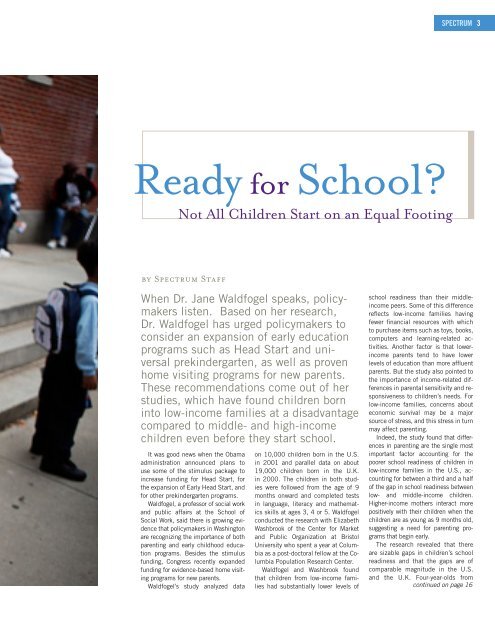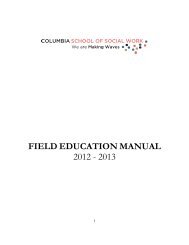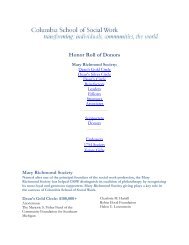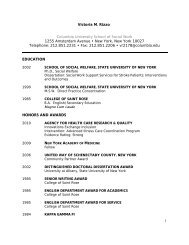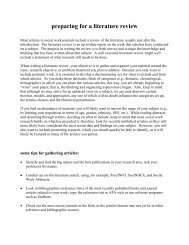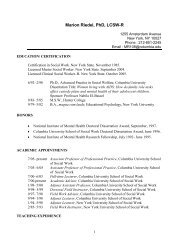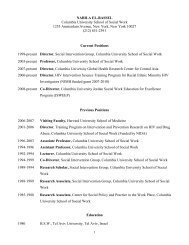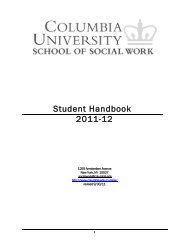Fall 2009 - Columbia University School of Social Work
Fall 2009 - Columbia University School of Social Work
Fall 2009 - Columbia University School of Social Work
You also want an ePaper? Increase the reach of your titles
YUMPU automatically turns print PDFs into web optimized ePapers that Google loves.
Spectrum 3Ready for <strong>School</strong>?Not All Children Start on an Equal Footingby Spectrum StaffWhen Dr. Jane Waldfogel speaks, policymakerslisten. Based on her research,Dr. Waldfogel has urged policymakers toconsider an expansion <strong>of</strong> early educationprograms such as Head Start and universalprekindergarten, as well as provenhome visiting programs for new parents.These recommendations come out <strong>of</strong> herstudies, which have found children borninto low-income families at a disadvantagecompared to middle- and high-incomechildren even before they start school.It was good news when the Obamaadministration announced plans touse some <strong>of</strong> the stimulus package toincrease funding for Head Start, forthe expansion <strong>of</strong> Early Head Start, andfor other prekindergarten programs.Waldfogel, a pr<strong>of</strong>essor <strong>of</strong> social workand public affairs at the <strong>School</strong> <strong>of</strong><strong>Social</strong> <strong>Work</strong>, said there is growing evidencethat policymakers in Washingtonare recognizing the importance <strong>of</strong> bothparenting and early childhood educationprograms. Besides the stimulusfunding, Congress recently expandedfunding for evidence-based home visitingprograms for new parents.Waldfogel’s study analyzed dataon 10,000 children born in the U.S.in 2001 and parallel data on about19,000 children born in the U.K.in 2000. The children in both studieswere followed from the age <strong>of</strong> 9months onward and completed testsin language, literacy and mathematicsskills at ages 3, 4 or 5. Waldfogelconducted the research with ElizabethWashbrook <strong>of</strong> the Center for Marketand Public Organization at Bristol<strong>University</strong> who spent a year at <strong>Columbia</strong>as a post-doctoral fellow at the <strong>Columbia</strong>Population Research Center.Waldfogel and Washbrook foundthat children from low-income familieshad substantially lower levels <strong>of</strong>school readiness than their middleincomepeers. Some <strong>of</strong> this differencereflects low-income families havingfewer financial resources with whichto purchase items such as toys, books,computers and learning-related activities.Another factor is that lowerincomeparents tend to have lowerlevels <strong>of</strong> education than more affluentparents. But the study also pointed tothe importance <strong>of</strong> income-related differencesin parental sensitivity and responsivenessto children’s needs. Forlow-income families, concerns abouteconomic survival may be a majorsource <strong>of</strong> stress, and this stress in turnmay affect parenting.Indeed, the study found that differencesin parenting are the single mostimportant factor accounting for thepoorer school readiness <strong>of</strong> children inlow-income families in the U.S., accountingfor between a third and a half<strong>of</strong> the gap in school readiness betweenlow- and middle-income children.Higher-income mothers interact morepositively with their children when thechildren are as young as 9 months old,suggesting a need for parenting programsthat begin early.The research revealed that thereare sizable gaps in children’s schoolreadiness and that the gaps are <strong>of</strong>comparable magni tude in the U.S.and the U.K. Four-year-olds fromcontinued on page 16


